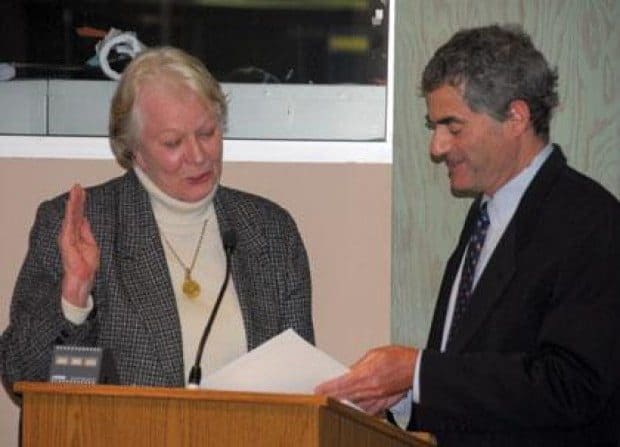
Going the easy route, the council votes to “oppose” cat declawing, rather banning it.
By Olivia Damavandi / Assistant Editor
After Sharon Barovsky and Jefferson Wagner were sworn in as the new mayor and mayor pro tem, respectively, the city council at its Monday night meeting voted to deny medical marijuana dispensary Green Angel’s appeal for a conditional use permit. The council also considered changes regarding temporary use permitting, which could impact the possibility of lighting on Malibu High School’s football field.
In addition, the council also voted to schedule the adoption of an ordinance to create landscape water conservation standards, and adopted a resolution opposing the declawing of cats within the city.
The application by Green Angel requested a CUP to allow its continued operation in an existing commercial building located at 21355 Pacific Coast Highway near the old Malibu Courthouse. It also requested a variance to allow it to operate within a 1,000-foot radius of Las Flores Canyon Park.
Though current city law allows a maximum of three medical marijuana dispensaries, the council passed a distance ordinance earlier this year that prohibits any dispensaries from setting up shop within a 1,000-foot radius of parks, places of religious affiliation and schools, among other locations. When the city originally approved the operation of Green Angel approximately a year and a half ago, the distance ordinance did not exist.
Green Angel attorney Steve Schectman argued that, if calculated over the mountain ridge and houses that lie between, the dispensary’s distance from the park is less than 1,000 feet, but if one drove to the park, the distance would be further. But the council disagreed, and even considered allowing only one dispensary within city limits after Hap Henry, Malibu High School student body president, said medical marijuana is infiltrating the school and harm ing the students.
Councilmember says buy earplugs for night games
Henry, along with MHS parents, also voiced his support for temporary lights to be permitted for night games when the council agreed to consider potential changes to the Local Coastal Plan, and directed the Planning Commission to schedule a public hearing regarding the matter.
The California Coastal Commission last month voted to deny the school district’s request for temporary lights during football games because, among other reasons, it is not allowed in the city’s LCP. The city council voted a few days later to start an expedited process to get that feature of the LCP changed. Any change to the LCP would have to be approved by the Coastal Commission.
But numerous residents who live near the school’s field protested the use of any lights at all due to noise, environmental and other concerns. Councilmember Pamela Conley Ulich, a Point Dume resident used to hearing peacocks in the middle of the night, said many of things in the community make noise, and recommended that those opposed to occasional night games invest in a pair of earplugs.
The council then voted to pass a resolution opposing, rather than banning, the declawing of cats within the City of Malibu after Barovsky and Conley Ulich referenced contradictory statistics about the practice from various sources.
The resolution does not prohibit the declawing as originally intended by Conley Ulich. Instead, it states that they recommend the procedure only be used as a last resort and only to save a cat’s life. The issue of declawing is highly controversial. Some call it a cruel mutilation while others see it as a simple solution to a cat that insists on scratching up the house. Veterinarians say there are many alternatives to declawing, such as training cats to use a scratching post. But there have also been cases where multiple efforts have been made and the owner is faced with the decision to declaw, abandon or euthanize the cat.
Lastly, the council voted to schedule the adoption of an ordinance to create landscape water conservation standards at its Nov. 23 meeting. The ordinance is proposed to comply with the Water Conservation in Landscaping Act of 2006, and to add an outdoor water use reduction component to the city’s green building and sustainability program.
It includes landscape and irrigation design standards that provide for the following: water conservation by the appropriate use and groupings of plants; limitations on the amount and locations that turf can be used; water budget calculations that establish the maximum amount of water to be applied through the irrigation system; automatic irrigation systems and irrigation schedules based on climatic conditions, terrains and soil types and other environmental conditions; and onsite soil assessment and soil management plans to promote healthy plant growth and prevent excessive erosion and runoff, among others. Costs for administering the proposed ordinance would be recovered through collection of established permit fees.
